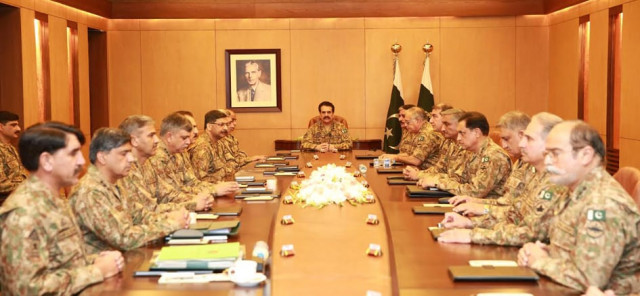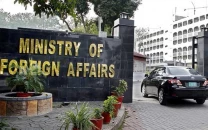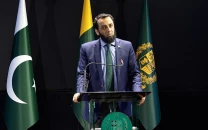Military courts: Army concerned over rifts among political leaders
Hopes consensus will not be overshadowed by smaller issues

"The nation is looking towards the political and military leadership to take bold and meaningful decisions," Chief of Army Staff Gen Raheel Sharif. PHOTO: ISPR
Pakistan’s top military brass is increasingly worried about differences emerging among political parties over the establishment of military courts out of fear that the strong consensus achieved against terrorism would not be overshadowed by ‘smaller issues.’
The controversy came under discussion during Thursday’s meeting of corps commanders presided over by army chief General Raheel Sharif at the General Headquarters in Rawalpindi.
A statement issued by Inter-Services Public Relations (ISPR) suggested that military commanders emphasised the need to keep intact the consensus achieved against terrorism following the massacre at the Army Public School in Peshawar.
“The corps commanders hoped that the much wanted and precious wider political consensus achieved against terrorism is not lost to smaller issues,” the military’s media wing said. The reference to smaller issues is related to the ongoing controversy regarding the establishment of military courts to ensure the speedy trial of hardcore terrorists.
Initially, during the multiparty conference, the country’s civil and military leadership agreed to set up special courts manned by military officers. Later, however, Pakistan Peoples Party (PPP) and Pakistan Tehreek-e-Insaf (PTI) voiced their reservations over the move.

Both parties agreed in principle to support military courts but are not in favour of bringing a constitutional amendment for this purpose. They suggested changing the current Army Act to allow the provision for military courts to try civilians involved in terrorist attacks.
Aware of the importance of political backing for any action by the military, General Raheel appreciated the national political leadership for their resolve against terrorism.
“The entire nation is looking towards the political and military leadership of the country to take bold and meaningful decisions leading to stern action against terrorists and their sympathisers,” the army chief said. “The key [to defeating terrorism] lies in all institutions joining hands for an effective and prompt implementation of a comprehensive National Action Plan without losing any further time,” he was quoted as saying by ISPR.
Gen Raheel also reviewed the homework done by all concerned authorities to execute the tasks assigned to them in connection to the National Action Plan and directed them to follow strict timelines.
The corps commanders reviewed the overall internal and external security situation in the country with particular focus on the ongoing operations. The recent upsurge in intelligence-based operations (IBOs) across the country was also reviewed and its effects were appreciated.
“Participants of the conference expressed grief over the tragic loss of innocent lives in Peshawar terrorist attack, solidarity with bereaved families and resolved not to stop operations till elimination of last terrorist from our soil,” the ISPR statement said.
Published in The Express Tribune, January 2nd, 2015.





1675249047-0/image-(18)1675249047-0-208x130.webp)













COMMENTS
Comments are moderated and generally will be posted if they are on-topic and not abusive.
For more information, please see our Comments FAQ